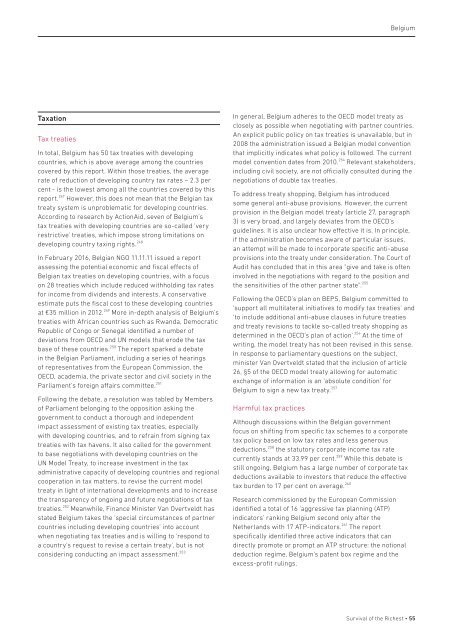Create successful ePaper yourself
Turn your PDF publications into a flip-book with our unique Google optimized e-Paper software.
Belgium<br />
Taxation<br />
Tax treaties<br />
In total, Belgium has 50 tax treaties with developing<br />
countries, which is above average among <strong>the</strong> countries<br />
covered by this report. Within those treaties, <strong>the</strong> average<br />
rate <strong>of</strong> reduction <strong>of</strong> developing country tax rates – 2.3 per<br />
cent - is <strong>the</strong> lowest among all <strong>the</strong> countries covered by this<br />
report. 247 However, this does not mean that <strong>the</strong> Belgian tax<br />
treaty system is unproblematic for developing countries.<br />
According to research by ActionAid, seven <strong>of</strong> Belgium’s<br />
tax treaties with developing countries are so-called 'very<br />
restrictive' treaties, which impose strong limitations on<br />
developing country taxing rights. 248<br />
In February 2016, Belgian NGO 11.11.11 issued a report<br />
assessing <strong>the</strong> potential economic and fiscal effects <strong>of</strong><br />
Belgian tax treaties on developing countries, with a focus<br />
on 28 treaties which include reduced withholding tax rates<br />
for income from dividends and interests. A conservative<br />
estimate puts <strong>the</strong> fiscal cost to <strong>the</strong>se developing countries<br />
at €35 million in 2012. 249 More in-depth analysis <strong>of</strong> Belgium’s<br />
treaties with African countries such as Rwanda, Democratic<br />
Republic <strong>of</strong> Congo or Senegal identified a number <strong>of</strong><br />
deviations from OECD and UN models that erode <strong>the</strong> tax<br />
base <strong>of</strong> <strong>the</strong>se countries. 250 The report sparked a debate<br />
in <strong>the</strong> Belgian Parliament, including a series <strong>of</strong> hearings<br />
<strong>of</strong> representatives from <strong>the</strong> European Commission, <strong>the</strong><br />
OECD, academia, <strong>the</strong> private sector and civil society in <strong>the</strong><br />
Parliament’s foreign affairs committee. 251<br />
Following <strong>the</strong> debate, a resolution was tabled by Members<br />
<strong>of</strong> Parliament belonging to <strong>the</strong> opposition asking <strong>the</strong><br />
government to conduct a thorough and independent<br />
impact assessment <strong>of</strong> existing tax treaties, especially<br />
with developing countries, and to refrain from signing tax<br />
treaties with tax havens. It also called for <strong>the</strong> government<br />
to base negotiations with developing countries on <strong>the</strong><br />
UN Model Treaty, to increase investment in <strong>the</strong> tax<br />
administrative capacity <strong>of</strong> developing countries and regional<br />
cooperation in tax matters, to revise <strong>the</strong> current model<br />
treaty in light <strong>of</strong> international developments and to increase<br />
<strong>the</strong> transparency <strong>of</strong> ongoing and future negotiations <strong>of</strong> tax<br />
treaties. 252 Meanwhile, Finance Minister Van Overtveldt has<br />
stated Belgium takes <strong>the</strong> ‘special circumstances <strong>of</strong> partner<br />
countries including developing countries’ into account<br />
when negotiating tax treaties and is willing to ‘respond to<br />
a country’s request to revise a certain treaty’, but is not<br />
considering conducting an impact assessment. 253<br />
In general, Belgium adheres to <strong>the</strong> OECD model treaty as<br />
closely as possible when negotiating with partner countries.<br />
An explicit public policy on tax treaties is unavailable, but in<br />
2008 <strong>the</strong> administration issued a Belgian model convention<br />
that implicitly indicates what policy is followed. The current<br />
model convention dates from 2010. 254 Relevant stakeholders,<br />
including civil society, are not <strong>of</strong>ficially consulted during <strong>the</strong><br />
negotiations <strong>of</strong> double tax treaties.<br />
To address treaty shopping, Belgium has introduced<br />
some general anti-abuse provisions. However, <strong>the</strong> current<br />
provision in <strong>the</strong> Belgian model treaty (article 27, paragraph<br />
3) is very broad, and largely deviates from <strong>the</strong> OECD’s<br />
guidelines. It is also unclear how effective it is. In principle,<br />
if <strong>the</strong> administration becomes aware <strong>of</strong> particular issues,<br />
an attempt will be made to incorporate specific anti-abuse<br />
provisions into <strong>the</strong> treaty under consideration. The Court <strong>of</strong><br />
Audit has concluded that in this area "give and take is <strong>of</strong>ten<br />
involved in <strong>the</strong> negotiations with regard to <strong>the</strong> position and<br />
<strong>the</strong> sensitivities <strong>of</strong> <strong>the</strong> o<strong>the</strong>r partner state”. 255<br />
Following <strong>the</strong> OECD’s plan on BEPS, Belgium committed to<br />
‘support all multilateral initiatives to modify tax treaties’ and<br />
‘to include additional anti-abuse clauses in future treaties<br />
and treaty revisions to tackle so-called treaty shopping as<br />
determined in <strong>the</strong> OECD’s plan <strong>of</strong> action’. 256 At <strong>the</strong> time <strong>of</strong><br />
writing, <strong>the</strong> model treaty has not been revised in this sense.<br />
In response to parliamentary questions on <strong>the</strong> subject,<br />
minister Van Overtveldt stated that <strong>the</strong> inclusion <strong>of</strong> article<br />
26, §5 <strong>of</strong> <strong>the</strong> OECD model treaty allowing for automatic<br />
exchange <strong>of</strong> information is an ‘absolute condition’ for<br />
Belgium to sign a new tax treaty. 257<br />
Harmful tax practices<br />
Although discussions within <strong>the</strong> Belgian government<br />
focus on shifting from specific tax schemes to a corporate<br />
tax policy based on low tax rates and less generous<br />
deductions, 258 <strong>the</strong> statutory corporate income tax rate<br />
currently stands at 33.99 per cent. 259 While this debate is<br />
still ongoing, Belgium has a large number <strong>of</strong> corporate tax<br />
deductions available to investors that reduce <strong>the</strong> effective<br />
tax burden to 17 per cent on average. 260<br />
Research commissioned by <strong>the</strong> European Commission<br />
identified a total <strong>of</strong> 16 ‘aggressive tax planning (ATP)<br />
indicators’ ranking Belgium second only after <strong>the</strong><br />
Ne<strong>the</strong>rlands with 17 ATP-indicators. 261 The report<br />
specifically identified three active indicators that can<br />
directly promote or prompt an ATP structure: <strong>the</strong> notional<br />
deduction regime, Belgium’s patent box regime and <strong>the</strong><br />
excess-pr<strong>of</strong>it rulings.<br />
<strong>Survival</strong> <strong>of</strong> <strong>the</strong> <strong>Richest</strong> • 55


